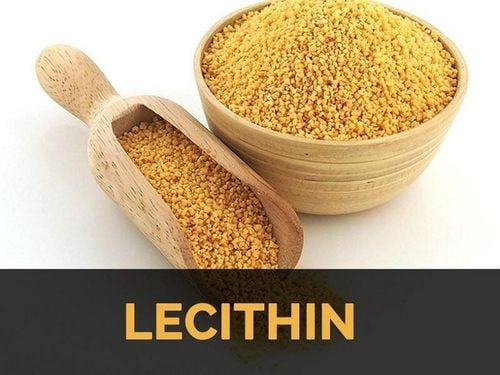This is an automatically translated article.
With some benefits and very few risks, lecithin may be an option for people looking to improve cholesterol and organ function. However, you should discuss it with your doctor before starting treatment. In addition, you should also pay attention to use only when absolutely necessary because lecithin is available in foods and like other nutrients, it is best absorbed in its natural form.
1. What is Lecithin?
Lecithin is a substance found naturally in the tissues of the body. It is made up of fatty acids and has many commercial and medical uses. Lecithin acts as an emulsifier, which means it prevents fats and oils from mixing with other substances.
Lecithin supplements can be purchased to help treat high cholesterol as an aid in lactation and to treat ulcerative colitis, ...
Lecithin in food is usually derived from sunflower seeds , eggs or soybeans, which are mainly from soybeans. Animal fats, fish and corn are rarely used to make lecithin. Soy lecithin is mainly sold in capsule form, while sunflower lecithin comes in both powder and liquid form. Sunflower lecithin is not as popular as soy, but it is a better choice for people who avoid using genetically modified foods. The extraction process also uses less chemicals than soy lecithin.
2. What are the effects of Lecithin?
What is the effect of Lecithin? You can find out information about their benefits as follows:2.1. Lower cholesterol
Lecithin has the ability to lower blood cholesterol. Many studies suggest that it can lower bad LDL cholesterol and increase good HDL cholesterol in the blood. In addition, lecithin combined with other ingredients in soybeans also has the effect of promoting the control of blood cholesterol.
2.2. Improve heart health
Soy lecithin may improve heart health, especially for people at risk for high blood pressure or cardiovascular disease. Since soy is complex to digest, it takes longer for the body to break down. For some people, this helps to create a feeling of fullness after use.
2.3. Supporting breastfeeding mothers
Some experts recommend lecithin as a solution to prevent recurrent blocked ducts. The Canadian Breastfeeding Foundation recommends that mothers prevent blocked milk ducts by using lecithin with a concentration of 1,200 mg / dose, 4 times / day.
Lecithin prevents blocked milk ducts thanks to its ability to reduce the viscosity of breast milk. However, it is not used as a treatment for blocked milk ducts. You can treat blocked milk ducts in other ways such as:
Warm massage Using a breast pump Draining a breast abscess Get medical advice Report symptoms of inflammation such as feeling fever to the doctor
2.4. Helps improve digestion
Lecithin has been tested in people with ulcerative colitis to improve digestive function. The emulsifier of lecithin contributes to a chain reaction that improves mucus in the intestines, makes digestion easier and protects the delicate lining of the digestive system.
Even if you don't have ulcerative colitis, you might consider taking lecithin if you have irritable bowel syndrome or another condition that affects digestion.

Lecithin giúp hỗ trợ và cải thiện chức năng của hệ tiêu hóa
2.5. May combat symptoms of dementia
Lecithin contains choline - a neurotransmitter that can improve brain function. A diet rich in choline can make memory sharper, helping people with Alzheimer's disease.
There is conflict about the benefits of lecithin in the treatment of diseases related to the nervous system, but the studies are promising.
2.6. Soothes and moisturizes skin
Lecithin is found in some skin care products. It is used as an emollient, making the skin smooth by restoring hydration.
However, there is not much evidence that lecithin when used alone can cure acne and eczema.
3. Risks and complications
People with egg allergy and soy allergy should read product labels carefully to choose the right type of lecithin to avoid allergic reactions.
Lecithin can be found in abundance in egg and meat products. However, the lecithin that occurs naturally in these foods does not present any risks.
Supplements are not monitored by the US Food and Drug Administration, so the effects and side effects are not well understood. People taking lecithin need to be aware of dosage recommendations and not exceed 5,000 milligrams per day.
Please dial HOTLINE for more information or register for an appointment HERE. Download MyVinmec app to make appointments faster and to manage your bookings easily.
Reference source: healthline.com













